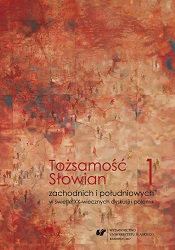Opisy podróży po krajach słowiańskich z lat 50. i 60. XX wieku: próba podtrzymania filosłowiańskiej tożsamości Górnołużyczan czy jej destrukcja?
Descriptions of travels around Slavic countries from the 1950s and 1960s: an attempt to preserve the philo‑Slavic identity of Upper Sorbs or to destroy it?
Author(s): Tomasz Derlatka
Subject(s): Language and Literature Studies, Studies of Literature, Theory of Literature
Published by: Wydawnictwo Uniwersytetu Śląskiego
Keywords: Upper Sorbian literature; pućowanske rozprawy; ideological functionalisation of travel descriptions
Summary/Abstract: The purpose of this paper is to outline issues associated with the process of assigning ideological functions to descriptions of travels of Upper Sorbs around Slavic countries (pućowanske rozprawy) in the 1950s and 1960s. Narrowing considerations of the issues concerned with the specified timeframe results from the culmination of this thematic and genre convention in this period, whereas its choice as the subject to be discussed – foran incredibly important semiotic function was served at that time by travel literature as regards the literature, culture and ideology (national and political) of Upper Sorbs. Travel descriptions written by Upper Sorbs in the 1950s and 1960s are a continuation of the tradition of pućowanske rozprawy of the 19th century and the first half of the subsequent century. Descriptions of travels around Slavic countries written before the war and those written after the war differ significantly as regards the motivations for their compilation. What changed most was their function. Illustrating, or strengthening the Slavic national consciousness of people living in Upper Lusatia, was no longer the main purpose of this literature (which was the case in the 19th century). After the war, travel descriptions were supposed to illustrate socialist transformations taking place in those countries. Accounts of travels around Slavic countries written by Upper Sorbs emphasized clearly and directly the social and technological development of Slavic states (nations) and even individual citizens owed to socialism. Due to the fact that the community living in Upper Lusatia was dominated by peasants, and given the ideological struggle taking place in Lusatia with respect to the collectivization of agriculture, political and social transformations were illustrated mainly through agrarian ones.
- Page Range: 263-276
- Page Count: 14
- Publication Year: 2017
- Language: Polish
- Content File-PDF

